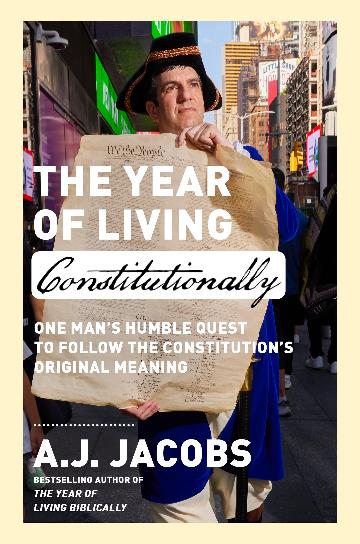A.J. Jacobs
The Year Of Living Constitutionally
The Year Of Living Constitutionally
Couldn't load pickup availability
Publishes 22 Aug 2024.
Gabi's Review
American journalist and author A.J. Jacobs’ new book takes on the challenge of so-called originalists: people who argue for the primacy of the United States constitutional document. This argument was used by the Supreme Court to overturn Roe v Wade, thereby removing the federal right to abortion. Not having read the constitution, Jacobs decided to unpack the document in a deep dive: the result is a highly informative and entertaining read. He combines his scholarly investigation with a hilarious one-year re-enactment of the historical dictates of the constitution that see him, as was the custom of the day, announcing his preferences out loud to the polling official. In this one example among many, Jacobs was clearly having fun at the expense of literal interpretations of the Constitution, while at the same raising an important question about the power of the Supreme Court as the arbiter of Constitutional meaning.
Originalism came to the fore in the 1980s as a means of curtailing, if not eradicating altogether, what conservatives saw as the then-liberal Supreme Court’s overreach. In opposition to the Originalists are the Living Constitutionalists, who, as their name suggests, see the need for the Constitution to adapt the meanings of words to reflect a changing morality. Jacobs uses as an example the 14th Amendment, which promises “equal protection” for all. While he acknowledges that the authors of the 14th Amendment in 1866 almost certainly did not intend this protection to apply to gay marriage, he maintains that living constitutionalism should offer such protection in the light of changing social attitudes about homosexuality and the concept of marriage. Jacobs also considers the biggest criticism of living constitutionalism; namely, the danger that the Constitution can be interpreted to mean whatever people want it mean, regardless of logic or reason. The ‘slippery slope,’ as it were, about interpretation. His response makes for intelligent and engrossing reading.
A.J. Jacobs’ previous book, The Year of Living Biblically, was a similar deep dive into lived experience for humorous ends, in which he was forbidden, amongst other archaic ideas, to touch his wife when she was menstruating. Just as he did with the Bible, Jacobs’s new book provides a crash course on our Constitution, as he experiences the benefits and perils of living as if he’s in the 1790s. While he relishes, for example, a period of history free from social media alerts, he also endorses social progress, such as the right for women to own property.
The Year of Living Constitutionally is a timely, if not urgent book, which asks Americans to understand the meaning and purpose of the Constitution. As politicians and Supreme Court Justices wage a high stakes battle over literal versus adaptive interpretations, Jacobs provides an illuminating and highly readable argument about the application of the Constitution in our democracy today.
Publishers Reviews
The New York Times bestselling author of The Year of Living Biblically chronicles his hilarious adventures in attempting to follow the original meaning of the Constitution, as he searches for answers to one of the most pressing issues of our time- How should we interpret America's foundational document?
The New York Times bestselling author of The Year of Living Biblically chronicles his hilarious adventures in attempting to follow the original meaning of the Constitution, as he searches for answers to one of the most pressing issues of our time- How should we interpret America's foundational document?
"I don't know how I learned so much while laughing so hard."-Andy Borowitz
A.J. Jacobs learned the hard way that donning a tricorne hat and marching around Manhattan with a 1700s musket will earn you a lot of strange looks. In the wake of several controversial rulings by the Supreme Court and the on-going debate about how the Constitution should be interpreted, Jacobs set out to understand what it means to live by the Constitution.
In The Year of Living Constitutionally, A.J. Jacobs tries to get inside the minds of the Founding Fathers by living as closely as possible to the original meaning of the Constitution. He asserts his right to free speech by writing his opinions on parchment with a quill and handing them out to strangers in Times Square. He consents to quartering a soldier, as is his Third Amendment right. He turns his home into a traditional 1790s household by lighting candles instead of using electricity, boiling mutton, and-because women were not allowed to sign contracts- feebly attempting to take over his wife's day job, which involves a lot of contract negotiations.
The book blends unforgettable adventures-delivering a handwritten petition to Congress, applying for a Letter of Marque to become a legal pirate for the government, and battling redcoats as part of a Revolutionary War reenactment group-with dozens of interviews from constitutional experts from both sides. Jacobs dives deep into originalism and living constitutionalism, the two rival ways of interpreting the document.
Much like he did with the Bible in The Year of Living Biblically, Jacobs provides a crash course on our Constitution as he experiences the benefits and perils of living like it's the 1790s. He relishes, for instance, the slow thinking of the era, free from social media alerts. But also discovers the progress we've made since 1789 when married women couldn't own property.
Now more than ever, Americans need to understand the meaning and value of the Constitution. As politicians and Supreme Court Justices wage a high-stakes battle over how literally we should interpret the Constitution, A.J. Jacobs provides an entertaining yet illuminating look into how this storied document fits into our democracy today.
Share


